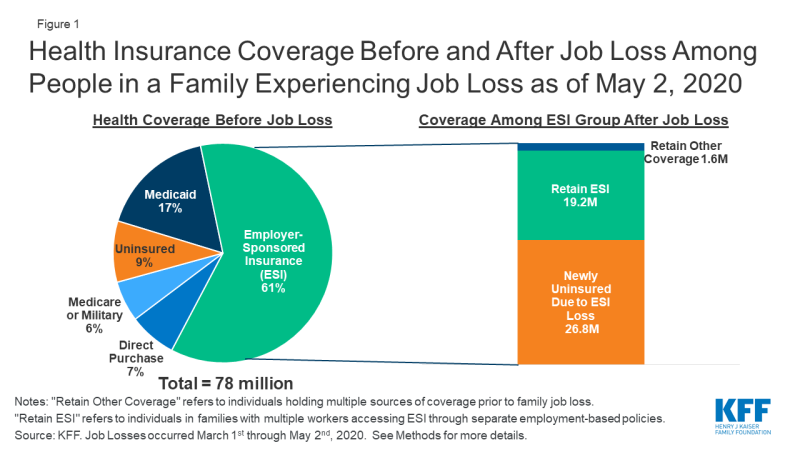Kaiser Family Foundation: Eligibility for ACA Health Coverage Following Job Loss; What Is ESI?
The economic consequences of the coronavirus pandemic have led to historic level of job loss in the United States. Social distancing policies required to address the crisis have led many businesses to cut hours, cease operations, or close altogether. Between March 1st and May 2nd, 2020, more than 31 million people had filed for unemployment insurance. Actual loss of jobs and income are likely even higher, as some people may be only marginally employed or may not have filed for benefits. Some of these unemployed workers may go back to work as social distancing curbs are relaxed, though further job loss is also possible if the economic downturn continues or deepens.
In addition to loss of income, job loss carries the risk of loss of health insurance for people who were receiving health coverage as a benefit through their employer. People who lose employer-sponsored insurance (ESI) often can elect to continue it for a period by paying the full premium (called COBRA continuation) or may become eligible for Medicaid or subsidized coverage through the Affordable Care Act (ACA) marketplaces. Over time, as unemployment benefits end, some may fall into the “coverage gap” that exists in states that have not expanded Medicaid under the ACA (Editor's Note: also known as ObamaCare).
In this analysis, we examine the potential loss of ESI among people in families where someone lost employment between March 1st, 2020 and May 2nd, 2020 and estimate their eligibility for ACA coverage, including Medicaid and marketplace subsidies, as well as private coverage as a dependent (see detailed Methods at the end of this brief). To illustrate eligibility as their state and federal unemployment insurance (UI) benefits cease, we show eligibility for this population as of May 2020 and January 2021, when most will have exhausted their UI benefits.
Pages: 1 · 2
More Articles
- Medicare Advantage Increasingly Popular With Seniors — But Not Hospitals and Doctors
- Medical Billing and Collections Among Older Americans
- Kaiser Health News*: May 11th Era of ‘Free’ Covid Vaccines, Test Kits, and Treatments Is Ending. Who Will Pay the Tab Now?
- Congressional Budget Office: Federal Budget Deficit Totals $1.4 Trillion in 2023; Annual Deficits Average $2.0 Trillion Over the 2024–2033 Period
- Stateline, Biden Likely to Help States Increase Health Care Access: December 15, 2020, Last Day to Enroll In or Change Plans for 2021 Coverage and GAO Reports on Breast and Cervical Cancer.
- Kaiser Health Foundation: Distributing a COVID-19 Vaccine Across the U.S. - A Look at Key Issues
- Chair Jerome H. Powell: A Current Assessment of the Response to the Economic Fallout of this Historic Event
- Automatic Stabilizers: What Are They and Do They Help Workers Who Stay Home Due to the Corona Virus?
- The Effort That It Takes to Give Someone a Good Death at Home; Hospice Care Can Badly Strain Families
- 4.7 Million Uninsured People Nationally Could Get a No-Premium Bronze Plan in the ACA Marketplace, Though Deductibles Would be High







